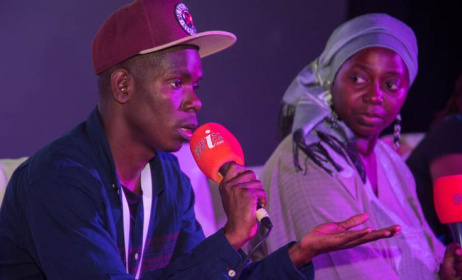ACCES 2018 embraces latest tech trends
Digital disruption has been a running theme in many industries and it featured prominently on Day 2 of the 2018 Music In Africa Conference for Collaborations, Exchange and Showcases (ACCES). The main hall and breakaway room of the Kenyan National Theatre hosted presentations and workshops that touched on the digital revolution in the music industry, as it did on Day 1.
 Africori boss Yoel Kenan.
Africori boss Yoel Kenan.
Over the last few years, technology has disrupted the various business models in the music industry, chief among them distribution. In the main hall, Africori founder and CEO Yoel Kenan delivered a presentation on music distribution models for Africa. Though technology has made the route to market easier for artists and record labels, it has also drastically increased competition.
“A few years ago, distribution to South America was difficult even for established artists but now with increased Internet penetration, it's easy," Kenan said, adding that the challenge now is to monitise content. He said revenue sharing had proven to be an effective model. It was better to make 10% of some revenue than a "100% of nothing".
Kenan emphasised the need for artists and distributors to understand their market. In order of priority, he classified the home audience as primary, followed by regional and international markets. He also spoke about the importance of non-musical content in music marketing such as narratives of the creation process.
Though still a novelty, virtual reality (VR) is fast becoming a game changer in the live concert space. For a few years now, Ulrico Grech-Cumbo has been running Deep VR, a South African cinematic studio looking break new ground with this technology. Starting out as a concert promoter, Grech-Cumbo opted to go into VR to mitigate the risk of depending on ticket sales as a primary revenue source.
“Sponsorship is the most effective way to cover concert costs,” he said. “VR helps increase the brand value of an event for sponsors. It's a hard sell but once people experience it they totally buy into it.”
Grech-Cumbo is also convinced that VR, which is becoming increasingly cheaper for event organisers to employ at their events, can solve concertgoers' concerns, including high ticket prices and concert crime.
Digital strategist Jude Clark presented a kitchen-sink model as a digital strategy for artists. The tiered system begins with brand identity, social media presence and a musical product. Once these are achieved, the next step is to grow brand assets by communicating brand-specific narratives. Building monetisable products and launching media campaigns that build a fan base is the next tier of her strategy. The final level includes copyright management, distribution and product sales.
The presentation involved marked plastic buckets appropriately placed in a pyramid to clearly illustrate each tier of the strategy. It proved an effective teaching tool that delegates took photos of for future reference.
“I was looking for a way to break down digital strategies in a way that is easy to understand so I came up with this illustration last night," she said. "This is just a basic model to take an emerging artist off the ground, after which there are more complex pyramids to take note of in the music business."
























Commentaires
s'identifier or register to post comments